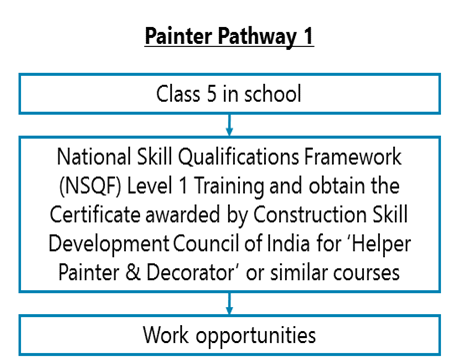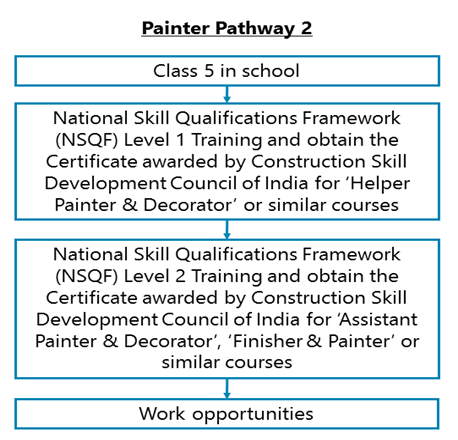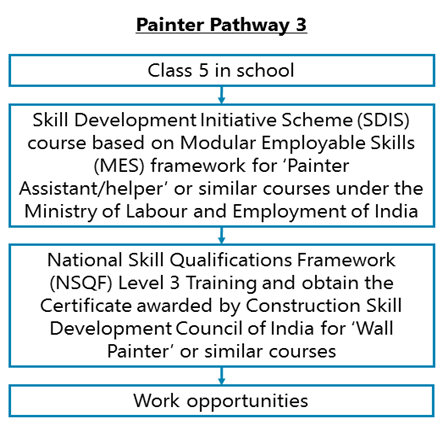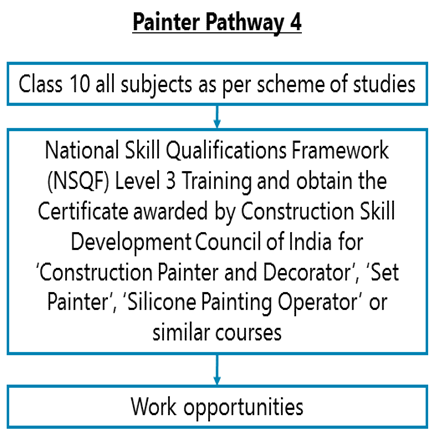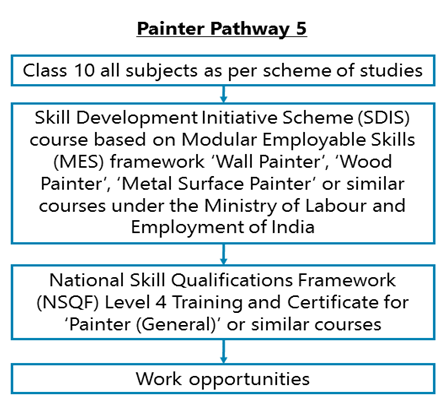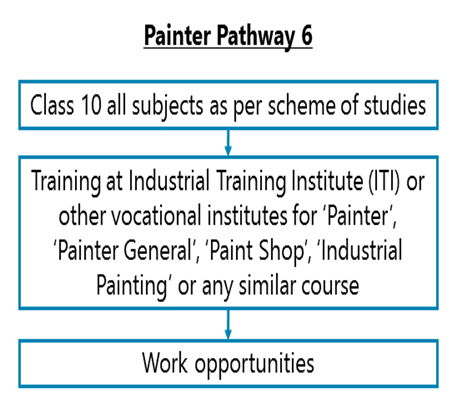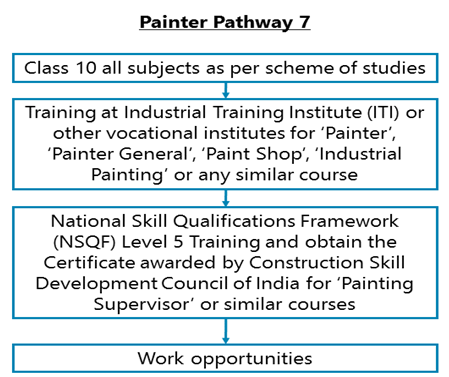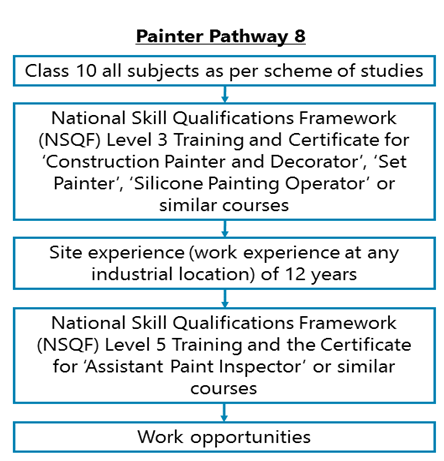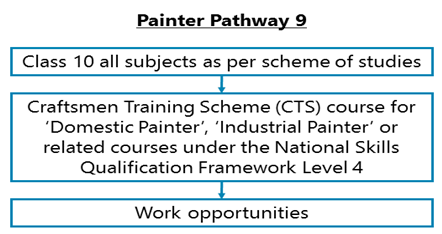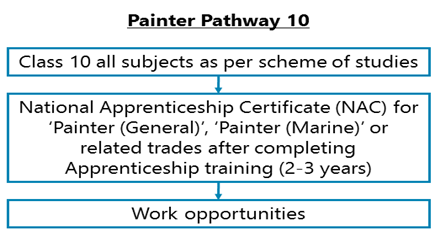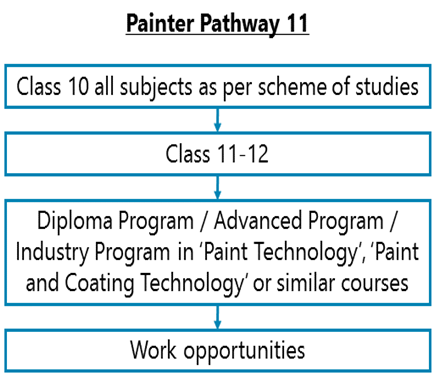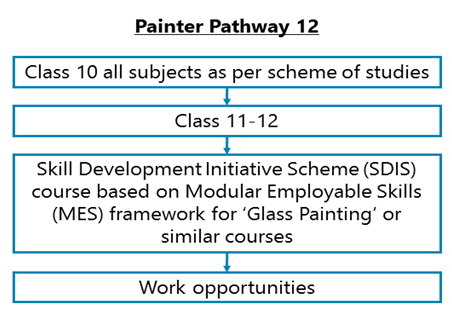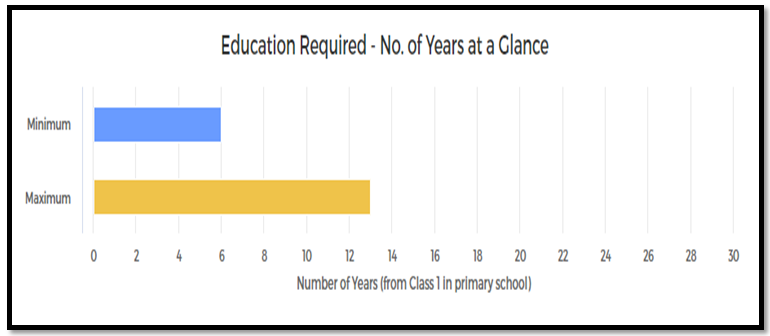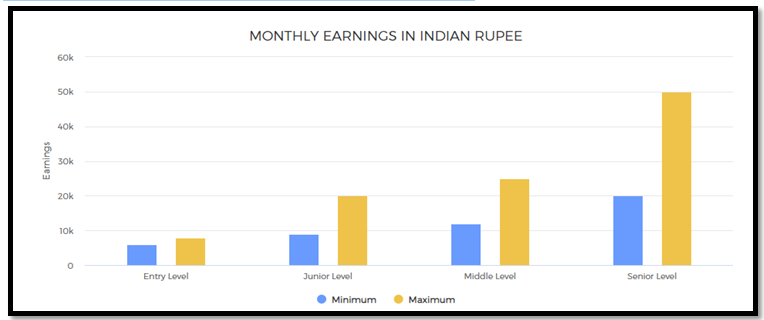Painter
Entry Level Qualification
8
Career Fields
Plumber, Fitter, Electrician, Welder & Carpenter
For Specially Abled




Career Entrance Exam
About Career
As a Painter, you will be applying paint and varnish coats to surfaces of wood, fabrics, glass, rubber, cement, wax, ceramics, jewellery, stone, metal, fibres, plastic etc. during the process of manufacture of any finished industrial product, or on signages / banners, or to exterior and interior walls of buildings.
You will need to select paint materials, mix them in appropriate proportions of paint, oil, thinner, drying substances, etc. You will also need to clean the surfaces from dirt, grease etc. or clean cracks or holes on the surfaces before applying paint.
Key Roles and Responsibilities
As a Painter, you will be involved in following key roles and responsibilities:-
1. Selecting paints according to company requirements, color charts, shade cards, specifications and other descriptions.
2. Mixing paint materials, maintaining proper proportions of pigment, oil, thinner drying substances etc.
3. Cleaning the surfaces from dirt, grease etc. or clean cracks or holes on the surfaces before applying paint using scrapers, abrasives, and chemical removers so that paint adheres properly.
4. Pouring paint/colours into spray guns, adjusting paint mixes and nozzles.
5. Masking or taping the areas that do not require painting.
6. Removing old coats by sanding, stripping, burning, wire brushing, watering or abrasive blasting.
7. Spraying prepared surfaces with the proper amount of primers before painting.
8. Applying prepared paint mixes in appropriate amounts with rollers, hand brushes etc.
9. Disposing hazardous wastes in an appropriate manner.
PARTICULARS | DESCRIPTION |
Name | Painter |
Purpose | Spraying prepared surfaces |
Career Field | Plumber, Fitter, Electrician, Welder & Carpenter |
Required Entrance Exam | No Entrance Exam |
Average Salary | 80000 - 100000 Rs. Per Year |
Companies For You | Master Painter, Paint Workshop Supervisor & Many More |
Who is Eligible | Any One |
Career Entry Pathway
Class 5 in school – NSQF Level 1 Training and Certificate for ‘Helper Painter & Decorator’ or similar courses
After completing Class 5 in school, you need to undergo National Skill Qualifications Framework (NSQF) Level 1 Training and obtain the Certificate awarded by Construction Skill Development Council of India for ‘Helper Painter & Decorator’ or similar courses. The total hours of training will be 300
Class 5 in school – NSQF Level 1 Training and Certificate for ‘Helper Painter & Decorator’ or similar courses - NSQF Level 2 Training and Certificate for ‘Assistant Painter & Decorator’ or similar courses
After completing Class 5 in school, to be a semi-skilled tradesman in this field you need to undergo National Skill Qualifications Framework (NSQF) Level 1 Training and obtain the Certificate awarded by Construction Skill Development Council of India for ‘Helper Painter & Decorator’ or similar courses. The total hours of training will be 300. Then you can undergo National Skill Qualifications Framework (NSQF) Level 2 Training and obtain the Certificate awarded by Construction Skill Development Council of India for ‘Assistant Painter & Decorator’, ‘Finisher & Painter’ or similar courses. The total hours of training will be 300-350. You need to be at least 14 years old for Level 2 courses
Class 5 in school - MES course for ‘Painter Assistant/helper’ or similar courses - NSQF Level 3 Training and Certificate for ‘Wall Painter’ or similar courses
After completing Class 5 in school, you can enroll for Skill Development Initiative Scheme (SDIS) course for ‘Painter Assistant/helper’ or similar courses based on Modular Employable Skills (MES) framework under the Ministry of Labour and Employment of India. The total hours of training will be 90. Then you can undergo National Skill Qualifications Framework (NSQF) Level 3 Training and obtain the Certificate awarded by Construction Skill Development Council of India for ‘Wall Painter’ or similar courses. The total hours of training will be 120-350
Class 10 all subjects as per scheme of studies – NSQF Level 3 Training and Certificate for ‘Construction Painter and Decorator’ or similar courses
After class 10, you need to undergo National Skill Qualifications Framework (NSQF) Level 3 Training and obtain the Certificate awarded by Construction Skill Development Council of India for ‘Construction Painter and Decorator’, ‘Set Painter’, ‘Silicone Painting Operator’ or similar courses. The total hours of training will be 120-350
Class 10 all subjects as per scheme of studies – MES course for ‘Painter Assistant/helper’ or similar courses - NSQF Level 4 Training and Certificate for ‘Painter (General)’ or similar courses
After class 10, you can enroll for Skill Development Initiative Scheme (SDIS) course for ‘Finisher & Painter’, ‘Wall Painter’, ‘Wood Painter’, ‘Metal Surface Painter’, ‘Spray Painter’, ‘Painter(Application, Testing, Handling and Storing)’ or similar courses based on Modular Employable Skills (MES) framework under the Ministry of Labour and Employment of India. The total hours of training will be 90. Then you need to undergo National Skill Qualifications Framework (NSQF) Level 4 Training and Certificate for ‘Painter (General)’, ‘Goldsmith - Enameller’, ‘Liquid Paint Processing Operator’, ‘Basholi Painting’, ‘Carving Artisan – Stonecraft’, ‘Decorative Painter — Glassware’, ‘Goldsmith – Kundan-Jadau’, ‘Painter (Metal Handicrafts)’, ‘Shop Tinting Assistant’, ‘Sketching and Painting Artisan (Ceramics)’ or similar courses. The total hours of training will be 120-4120
Class 10 all subjects as per scheme of studies - training at an ITI or similar institute for ‘Painter’ or related trades
After class 10, you need to undergo training at Industrial Training Institute (ITI), National Skill Training Institute (NSTI), Regional Vocational Training Institute (RVTI), National Vocational Training Institute (NVTI), Industrial Training Center (ITC) or other vocational institutes for ‘Painter’, ‘Painter General’, ‘Paint Shop’, ‘Industrial Painting’ or any similar course. After completing this training, you will sit for All India Trade Test (AITT) and you will get a National Trade Certificate (NTC) if you pass
Class 10 all subjects as per scheme of studies - training at an ITI or similar institute for ‘Painter’ or related trades - NSQF Level 5 Training and Certificate for ‘Painting Supervisor’ or similar courses
After class 10, you need to undergo training at Industrial Training Institute (ITI), National Skill Training Institute (NSTI), Regional Vocational Training Institute (RVTI), National Vocational Training Institute (NVTI), Industrial Training Center (ITC) or other vocational institutes for ‘Painter’, ‘Painter General’, ‘Paint Shop’, ‘Industrial Painting’ or any similar course. After completing this training, you will sit for All India Trade Test (AITT) and you will get a National Trade Certificate (NTC) if you pass. Then you can undergo National Skill Qualifications Framework (NSQF) Level 5 Training and obtain the Certificate awarded by Construction Skill Development Council of India for ‘Painting Supervisor’ or similar courses. The total hours of training will be 400
Class 10 all subjects as per scheme of studies – NSQF Level 3 Training and Certificate for ‘Construction Painter and Decorator’ or similar courses – work at site for 12 years - NSQF Level 5 Training and Certificate for ‘Assistant Paint Inspector’ or similar courses
After class 10, you need to undergo National Skill Qualifications Framework (NSQF) Level 3 Training and obtain the Certificate awarded by Construction Skill Development Council of India for ‘Construction Painter and Decorator’, ‘Set Painter’, ‘Silicone Painting Operator’ or similar courses. The total hours of training will be 120-350. Then after you have a site experience (work experience at any industrial location) of 12 years, you can undergo National Skill Qualifications Framework (NSQF) Level 5 Training and the Certificate for ‘Assistant Paint Inspector’ or similar courses
Class 10 all subjects as per scheme of studies - CTS NSQF Level 4 Training for ‘Domestic Painter’ or related courses
After class 10, you can go for the Craftsmen Training Scheme (CTS) course for ‘Domestic Painter’, ‘Industrial Painter’ or related courses under the National Skills Qualification Framework Level 4. This is a 1-year course with 2 semesters of 6 months each
Class 10 all subjects as per scheme of studies – obtain National Apprenticeship Certificate for ‘Painter (General)’ or related trades
After class 10, you can obtain a National Apprenticeship Certificate (NAC) for ‘Painter (General)’, ‘Painter (Marine)’ or related trades after completing Apprenticeship training. Apprenticeship training will be for 2-3 years
Class 10 all subjects as per scheme of studies – Class 11-12 with any subject combination as per scheme of studies – Diploma Program / Advanced Program / Industry Program in ‘Paint Technology’ or similar courses
After class 12, you can go for a Diploma Program / Advanced Program / Industry Program in ‘Paint Technology’, ‘Paint and Coating Technology’ or similar courses
Class 10 all subjects as per scheme of studies – Class 11-12 with any subject combination as per scheme of studies – MES course for ‘Glass Painting’ or similar courses
After class 12, you can go for Skill Development Initiative Scheme (SDIS) course for ‘Glass Painting’ or similar courses based on Modular Employable Skills (MES) framework under the Ministry of Labour and Employment of India.
Required Qualification & Competencies
After Class 5, you can go for:
1. NSQF Level 1/2/3 courses.
2. MES courses.
After Class 10, you can go for:
1. NSQF Level 3/4/5 courses.
2. MES courses.
3. ITI courses.
4. CTS courses.
5. NAC courses.
After Class 11-12, you can go for:
1. Diploma Program / Advanced Program / Industry Programs.
2. MES courses.
Various private/public vocational training establishments across India offer related courses for:
1. Paints Technologies
2. Domestic Painter
3. Industrial Painter
4. Painter General
5. Painter Marine
Compentencies Required
1. You should have interests for Realistic Occupations. Realistic occupations involve more practical and hands-on activities than paperwork or office work. Realistic occupations often involve physical activities for getting things done using various tools and equipment.
2. You should have interests for Conventional Occupations. Conventional occupations involve repetitive and routine tasks as well as fixed processes or procedures for getting things done. These occupations involve working more with data, systems, and procedures and less with ideas or creativity.
3. You should have Equipment Sourcing Skills- sourcing the right equipment for different purposes
4. You should have knowledge of Process and Operation Controlling - Skills in controlling processes and operations of various machines, equipment, devices and systems using different types of electrical and electronic control instruments and systems.
5. You should have Coordination Skills- working together with other people to get things done.
6. You should have Quality Control Analysis Skills- conducting tests and inspections of products, services, or processes to evaluate quality or performance.
7. You should have knowledge of Production and Processing - raw materials, production machinery, production systems, production processes, quality control, and other techniques for manufacturing or construction and distribution of goods.
8. You should have Arm-Hand Steadiness - The ability to keep your hand and arm steady while moving your arm or while holding your arm and hand in one position.
9. You should have Manual Dexterity - The ability to quickly move your hand, your hand together with your arm, or your two hands to grasp, manipulate, or assemble objects.
10. You should have Near Vision - The ability to see details at close range (within a few feet of the observer).
11. You should have Visual Color Discrimination Ability- The ability to match or detect differences between colors, including shades of colour and brightness.
12. You are always or mostly careful about your actions and behaviour.
13. You are practical always or in most situations.
14. You always or mostly prefer to stick within a routine or carry out routine and repetitive activities.
Career - Job Opportunities & Profiles
You will get roles like:
1. Painter
2. Finisher / Painter
3. Assistant Paint Inspector
4. Construction Painter and Decorator
5. Decorative Painter — Glassware
6. Set Painter
7. Shop Tinting Assistant
8. Silicone Painting Operator
9. Sketching and Painting Artisans – Ceramics
10. Wall Painter
11. Finisher & Painter - Soft Toys
12. General Industrial Painter
13. Gold Enameller
14. Helper Painter & Decorator
15. Marker & Signage Painter
16. Painter (Metal Handicrafts)
Specialisation Tracks In This Career
Industrial Painter
Industrial Painters are involved in applying paints, varnishes etc. to materials like wood, fabrics, glass, rubber, wax, ceramics, silicone, jewelry, stone, metal, fibers, plastic etc. during the process of manufacturing of any finished industrial product.
Domestic Painter
Domestic Painters are those who apply coats of paint on walls (both exterior and interior walls) to protect or decorate houses and buildings using spray guns, hand brushes etc.
Career Growth
From an entry-level position as a Trainee and then as a Junior level Painter, you can grow into higher roles such as a Senior Painting Technician, Master Painter, Paint Workshop Supervisor, Assistant Workshop Manager, Chargehand – Painting & Decoration, Assistant Supervisor – Visual Management etc.
Salary Offered
1. In the beginning of your career, you may expect to get about Rs. 6,000 – 8,000 or more per month.
2. After 2-5 years of experience, you may get about Rs. 9,000 – 20,000 or more per month.
3. After 6-10 years of experience, you may get about Rs. 12,000-25,000 or more a month.
4. With 13+ years of experience, you may earn about Rs. 20,000 – 50,000 or more per month.
5. However, if you can work independently, either as a home service provider or through your own business you may earn much more. An experienced and reputed painter may earn anywhere between Rs. 50,000 – 1,00,000 or more per month. There are a lot of opportunities in middle eastern and north african countries where you can earn anywhere between Rs. 80,000-1,50,000 a month depending upon your experience.
Monthly Earnings In Indian Rupee
1. Entry level: 0 - 2 years of work experience
2. Junior Level: From 1 to 12 years of work experience
3. Mid-Level: From 5 to 20+ years of work experience
4. Senior Level: From 10 to 25+ years of work experience (there could be exceptions in some high-end technical, financial, engineering, creative, management, sports, and other careers; also in the near future, people will reach these levels much faster in many careers and in some careers, these levels will have no meaning as those careers will be completely tech skill driven such as even now, there is almost no level in a Cyber Security Expert’s job)
Work Activities
1. Inspecting equipment, systems, structures, and materials – Inspecting equipment, systems, structures, and materials to ascertain quality, performance, defects, causes of errors, etc.
2. Handling and moving objects and materials –Using hands or otherwise use physical strength to handle and move objects and materials; manoeuvre, install, lift, place, manipulate, etc.
3. Identifying objects, actions, and events – Identifying various characteristics of objects; observing and understanding actions and events; understanding changes in actions and events.
4. Performing physical activities - Performing physical activities that require the use of your arms and legs and moving your whole body, such as climbing, lifting, balancing, walking, stooping, and handling of materials.
5. Getting Information and learning – Observing, hearing, reading or otherwise obtaining information from various sources and learning from it.
6. Communicating with co-workers and others – Communicating with people in writing, verbally or otherwise inside your workplace and various other people who have professional relationships with your place of work.
Future Prospects
The future for this pathway looks moderately bright. In India, the Construction industry is expected to reach 1 trillion US Dollars by 2030. It is also estimated that this industry will contribute around 13% to the country’s GDP by 2025. The emergence of nuclear families, rising household income and rapid urbanisation are to remain the key drivers for growth in the Real Estate sector. Gross office space absorption in major Indian cities has increased to more than 36.4 million square feet by the end of 2018. Warehousing space is estimated to reach 247 million square feet.
The Indian government’s ‘Housing for All’ scheme is expected to bring 1.3 trillion US Dollars’ worth of investments in the housing sector by 2025. The Gems and Jewelry sector in India is expected to generate around 8.23 million jobs . The Facilities Management market in India is predicted to grow at 17 per cent CAGR (Compounded Annual Growth Rate), supported by booming retail, real estate, and hospitality sectors. The Manufacturing sector in India has the potential to touch the mark of 1 trillion US Dollars by 2025. The Indian Retail industry is showing a substantial growth with rising disposable income and demand for quality products.
Future Prospects At a Glance


